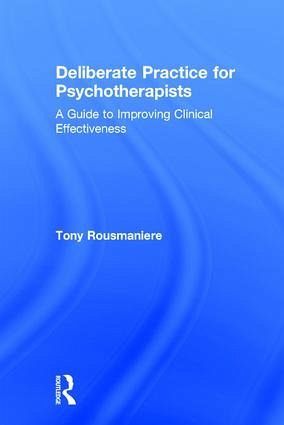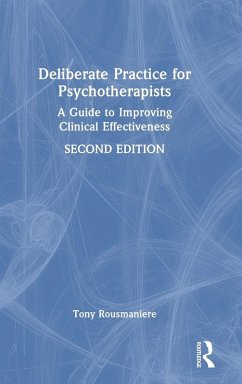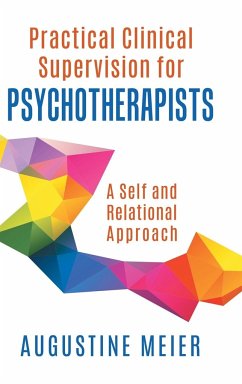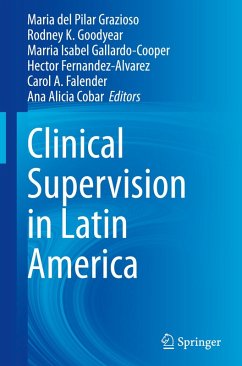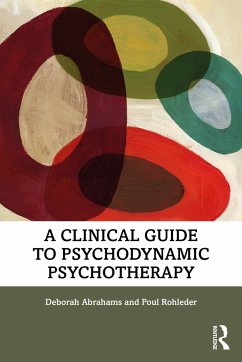Tony Rousmaniere
Gebundenes Buch
Deliberate Practice for Psychotherapists
A Guide to Improving Clinical Effectiveness
Versandkostenfrei!
Versandfertig in über 4 Wochen
Weitere Ausgaben:

PAYBACK Punkte
98 °P sammeln!





This text explores how psychotherapists can use deliberate practice to improve their clinical effectiveness.
Tony Rousmaniere is on the clinical faculty at the University of Washington, Seattle where he also maintains a private practice.
Produktdetails
- Verlag: Taylor & Francis
- Seitenzahl: 220
- Erscheinungstermin: 14. Dezember 2016
- Englisch
- Abmessung: 229mm x 152mm x 14mm
- Gewicht: 490g
- ISBN-13: 9781138203181
- ISBN-10: 1138203181
- Artikelnr.: 54153084
Herstellerkennzeichnung
Libri GmbH
Europaallee 1
36244 Bad Hersfeld
gpsr@libri.de
It is an essential psychotherapy skill, and has no direct competition. In my opinion, because the proposal and sample material has struck a nice balance between personal narrative and theory/research, I don't see a need for changes. Len Sperry,MD, PhD, Florida Atlantic University, and University of Wisconsin.
'Provides incredibly important information for trainees, practitioners, and supervisors across all levels of experience.'
Mark J. Hilsenroth, PhD, professor, Gordon F. Derner School of Psychology and past editor of the journal Psychotherapy.
'...Candid, bold, challenging, and constantly tied to clinical reality, this engrossing and innovative book offers creative insights and valuable tools to help clinicians become more effective, irrespective of their theoretical orientation and level of experience.'
Louis Castonguay, PhD, Penn State University; former president, Society for Psychotherapy Research.
'In Deliberate Practice for Psychotherapists: A Guide to Improving Clinical Effectiveness,
Mark J. Hilsenroth, PhD, professor, Gordon F. Derner School of Psychology and past editor of the journal Psychotherapy.
'...Candid, bold, challenging, and constantly tied to clinical reality, this engrossing and innovative book offers creative insights and valuable tools to help clinicians become more effective, irrespective of their theoretical orientation and level of experience.'
Louis Castonguay, PhD, Penn State University; former president, Society for Psychotherapy Research.
'In Deliberate Practice for Psychotherapists: A Guide to Improving Clinical Effectiveness,
Mehr anzeigen
...Rousmaniere provides a remarkably innovative and valuable contribution to the field of psychotherapy that draws upon observations and methods about the mastery of skills sets from multiple different professions. As such, I believe this book provides incredibly important information for trainees, practitioners, and supervisors across all levels of experience.'
Mark J. Hilsenroth, PhD, Adelphi University.
'Some psychotherapists consistently realize better client outcomes than their peers and the data show that they achieve this by having made a long-term commitment to engaging in deliberate practice (DP). But many psychotherapists remain unsure of just what DP is or how they might incorporate it in their own work. Rousmaniere answers these questions in a highly effective and engaging way. He takes the reader along on his own quest to become the best therapist he can and as he does, anchors his observations solidly in the research literature. The result is an essential guide for therapists for using DP to increase their expertise.'
Rodney Goodyear, professor, University of Redlands; emeritus professor of education (counseling psychology), University of Southern California.
Mark J. Hilsenroth, PhD, Adelphi University.
'Some psychotherapists consistently realize better client outcomes than their peers and the data show that they achieve this by having made a long-term commitment to engaging in deliberate practice (DP). But many psychotherapists remain unsure of just what DP is or how they might incorporate it in their own work. Rousmaniere answers these questions in a highly effective and engaging way. He takes the reader along on his own quest to become the best therapist he can and as he does, anchors his observations solidly in the research literature. The result is an essential guide for therapists for using DP to increase their expertise.'
Rodney Goodyear, professor, University of Redlands; emeritus professor of education (counseling psychology), University of Southern California.
Schließen
Für dieses Produkt wurde noch keine Bewertung abgegeben. Wir würden uns sehr freuen, wenn du die erste Bewertung schreibst!
Eine Bewertung schreiben
Eine Bewertung schreiben
Andere Kunden interessierten sich für



